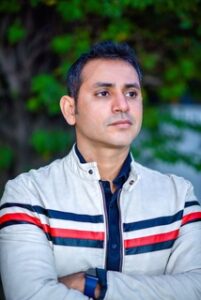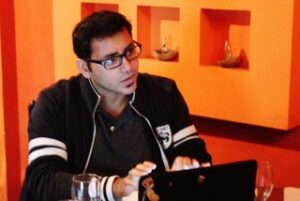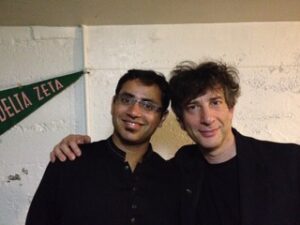
Dr. Malik
Novice writers often wait months, sometimes even years, before their first piece is published. However, Usman T. Malik, MBBS, shares a different experience. His letter to the editor of Bachon ka Pakistan, a Pakistani children’s publication, was published shortly after being submitted. He was just 7 years old.
Dr. Malik is now an assistant professor of medicine at the University of Central Florida, Orlando, and also acts as a consultant in the Division of Rheumatology, Department of Internal Medicine, at both Sanford Health, Bismarck, N.D., and Integrated Medical Care Hospital, Lahore, Pakistan. Since his writing debut more than 30 years ago, he has written articles that have been published by Wired, The Herald, Al Jazeera, EOS Magazine and The Rheumatologist. He has also written more than 30 horror and science fiction short stories, in which monsters, other-worldly creatures and humans—well, they start out that way—live on the pages. So far, 2,000 copies of his debut story collection, Midnight Doorways: Fables from Pakistan, have sold in 17 countries.
“As Anton Chekhov (renowned Russian playwright and doctor) said, ‘Medicine is my lawful wife and literature is my mistress,’” jokes Dr. Malik, who travels back and forth between Pakistan and the U.S. for work every few months.

Dr. Malik taught The Rising Dust Speculative
Fiction workshop in Lahore, Pakistan, 2014.
Dr. Malik’s writing skill and talent are not familial. His parents and other relatives are shopkeepers and businessmen.
He says his writing inspiration comes from reading, specifically work by Stephen King, the king of horror; Philip Roth, a novelist and short story writer; and many others. Since 2015, Dr. Malik has won four awards, two in 2022: the William L. Crawford Fantasy Award from the International Association for the Fantastic in Arts and the World Fantasy Award, Best Collection, from the World Fantasy Convention.
Priorities
Dr. Malik completed his higher secondary education (equivalent to high school graduation) in Pakistan in 2000 at the age of 18. From there, he went straight to medical school at Aga Khan University, Karachi, Pakistan, graduating in 2005 with a MBBS (Bachelor of Medicine, Bachelor of Surgery). Five years later, he completed his residency in internal medicine at Hennepin County Medical Center, Minneapolis, and his fellowship in rheumatology in 2018 in the Department of Rheumatology, University of Florida, Gainesville.

Dr. Malik with author Neil Gaiman at the Clarion West Writers Workshop in 2013.
He chose rheumatology because it offers a better work-life balance than other disciplines. “It came down to lifestyle,” he explains. “But I also found it very cognitive, which I enjoyed.”
Early on, writing, not medicine, was his initial career choice. When he was 12 years old, he vividly remembers advice from one of his teachers that probably changed the course of his life.
“My teacher said that writers starve in this country. At the time, I didn’t know that writers starved everywhere,” recalls Dr. Malik with a smile. “In the 1990s, as was the custom in Pakistan, I was told to either become an engineer or a doctor.”
He found giving up writing unthinkable, so during his first two of five years of medical school, he attended classes, played the guitar and wrote horror stories—not necessarily in that order. At the age of 19, he was hired as an assistant editor for a fantasy magazine, Deep Magic, and wrote a 25,000-word novella the magazine published.
“I always thought of myself as a horror writer,” says Dr. Malik, who suspects that if he had lived in the U.S. as a teenager, he probably would have embraced the goth subculture and lifestyle. “While I absolutely adored fantasy stories and poetry, later I shifted toward reading more horror.”
Perhaps he was afflicted by the starving student syndrome, but by his third year of medical school, he says, “I had to get serious about medical school. So I stopped writing for eight years, from 2004–2012.”
Beyond Blood & Terror
Looking back, he realizes how much he missed writing during those years. That may be why his writing has exploded over the past decade, with the publication of more than 30 short stories in the horror, science fiction and fantasy genres.
His stories aren’t simply about scary-looking monsters or aliens gobbling up people or destroying cities. They have underlying societal messages that focus on deeply felt personal issues.
Take his short story, The Vaporization Enthalpy of a Peculiar Pakistani Family, which is about a brother and sister who experience drone attacks in northern Pakistan. By the end of the story, the brother’s fury physically transforms him at a quantum level. In essence, he becomes the personification of pure rage. That story won the Bram Stoker award in 2015 from the global Horror Writers Association.
Currently, Dr. Malik is working on a haunted house novel set on the border of India and Pakistan. In 1947, British India was partitioned, ending 300 years of colonial rule. Two nations were created: India and Pakistan. But the mass migration of Hindus, Sikhs and Muslims on both sides were haunted by communal attacks, resulting in the bloody murders and deaths of nearly a million people.
“My book is set on that border and brings in the echo of that history,” Dr. Malik says, adding that a plague isolates the main characters from the rest of the world and “things happen.”
As a self-taught writer, Dr. Malik is represented by a New York agent, something many writers can only dream of, and has attended and also taught more than a dozen writing workshops and seminars over the past decade.
Within the next decade, he hopes to complete a few more novels, which may reflect medieval history. He says his current reading obsession is with the Moors of Spain, who were Muslims living in North Africa and the Iberian Peninsula (modern-day Spain and Portugal).
Reignite the Spark
Meanwhile, he reflects on burnout, saying rheumatologists and other physicians may be losing their “spark.”
“It’s a rat race,” Dr. Malik says, referring to the idea that a physician’s success is mostly based on their income and how many peer-reviewed articles they have published. “I want success to have a different barometer.”
He believes the humanities can help.
“Literature and the arts can make physicians kinder, and more compassionate and empathetic toward their patients,” says Dr. Malik. “Writing has done that for me.”
 Carol Patton is a freelance writer based in Las Vegas.
Carol Patton is a freelance writer based in Las Vegas.


